
Square Enix tries to evoke the theme of travel on a systemic level as well. Alongside their combat abilities, each character has a unique skill that is useful in some way on the road. Noctis has a talent for fishing, while Ignis is an able chef, cooking delicious looking meals that provide temporary yet significant stat-boosts. Prompto’s skill for photography is less obviously useful, but his images act as a record of the group's adventures, and flicking through these snapshots of your daily deeds when you rest at a campsite is curiously pleasing.
I really like the concept that drives Final Fantasy XV, and it’s fascinating to see male bonds depicted in a video game without the chest-beating, dude-bro machismo that’s so ingrained in the Western mainstream (although FFXV is still ultimately a game about driving cars, killing large animals and doing cool things with guns and swords). But like almost every aspect of FFXV, I don’t think it works as well as it could. The characterisation is about as subtle as Donald Trump’s Twitter feed, and the writing, while considerably better than most Final Fantasy games, is still something of an acquired taste. The focus on the four lead characters also comes at the cost of the wider cast, who by comparison have all the depth of a stick-man drawn on crepe paper.
Nevertheless, Final Fantasy does succeed in communicating that sense of camaraderie between the four friends and not just in camp and on the road. Combat, too, is built largely around teamwork, only very differently from previous entries in the series. The turn-based, random encounters have been dispensed entirely for a real-time hack-'n'-slash system. It’s admittedly quite an odd system that takes a while to get used to. For example, launching attacks and dodging enemies is done by holding down the requisite buttons rather than pressing them, then using the analogue stick to choose the direction of your dodge or the type of attack.
Furthermore, a timed press of the dodge button will block an attack, while a timed press of the attack button will perform a parry, often triggering an automatic, team-based special attack. On top of that, landing successful hits fills a 'tech' bar that allows you to activate more powerful group-based techniques such as Ignis’ 'Overwhelm', where the group bunch closely together and pile the damage onto a single opponent.
It doesn’t end there either. There’s a simple spell crafting system that enables you to create some impressive magical abilities, and if you meet a (very) particular set of requirements, you can summon the series’ hallmark aeons; gargantuan, godlike beings who are capable of turning even the most powerful enemies into meaty jam. Opportunities to summon them are few and far between, however. Indeed, the more magical elements of Final Fantasy XV’s combat system are the least involved, which is a shame.
The combat has a couple of other problems too. Like I said, the controls are counter-intuitive, and even once you get used to it it’s quite a messy system, with lots of different abilities and systems clumsily overlaid (clearly the result of a protracted development). What’s more, when you’re fighting a particularly large enemy, you must also battle the camera, which is especially unfortunate as these epic encounters are undoubtedly when the game is at its best.
But the biggest problem that faces Final Fantasy’s XV’s new direction is that its gorgeous and enticing open-world has a quest structure which has simply been outclassed during its years in the wilderness. After the inventive and ingeniously scripted quests of The Witcher 3 and the emergent brilliance of Metal Gear Solid V, Final Fantasy’s reliance on arbitrary-seeming fetch-quests and 'Hunts' that direct you to kill X number of mobs results in it feeling sorely out of date.
Occasionally you’ll come across a quest that’s considerably more in-depth, such as one in which a Chocobo-riding establishment asks you to hunt down a massive beast prowling the area. It’s a multi-layered mission filled with tension and drama, and had the rest of the game been like that, you’d be looking at a recommendation for sure. But generally, NPCs couldn’t be better suited as quest-dispensers if they had a coin-slot in their foreheads.
Instead of doubling down on the open-world, however, Final Fantasy XV eventually chooses to abandon it entirely. Halfway through the game, the structure switches to a much more linear path. From a storytelling perspective, the reason for this is understandable. As the plot becomes more urgent, it’s logical that Noctis and his buddies would have less opportunity for gadding around on their Chocobos. Logical, but a whole lot less fun. Plus, the story simply isn’t strong enough to support the switch to linearity as so much of the game’s resources have gone into Noctis et al rather than the wider cast.
All told, Final Fantasy XV isn’t a bad game, but as I was playing it, I was constantly thinking, 'It would have been better if they’d done it that way.' There’s a truly stellar road-tripping game in there somewhere, but like its central character it lacks confidence in its own ability. I think time has simply got away from it, and what might have been a pioneering RPG in 2010 is now just a bit staid, a bit old-hat. There are games which tell better stories and games which have better open worlds, and one game in particular that does both superbly. Because of that, despite its neat ideas, it’s rather difficult to recommend Final Fantasy XV.
I really like the concept that drives Final Fantasy XV, and it’s fascinating to see male bonds depicted in a video game without the chest-beating, dude-bro machismo that’s so ingrained in the Western mainstream (although FFXV is still ultimately a game about driving cars, killing large animals and doing cool things with guns and swords). But like almost every aspect of FFXV, I don’t think it works as well as it could. The characterisation is about as subtle as Donald Trump’s Twitter feed, and the writing, while considerably better than most Final Fantasy games, is still something of an acquired taste. The focus on the four lead characters also comes at the cost of the wider cast, who by comparison have all the depth of a stick-man drawn on crepe paper.
Nevertheless, Final Fantasy does succeed in communicating that sense of camaraderie between the four friends and not just in camp and on the road. Combat, too, is built largely around teamwork, only very differently from previous entries in the series. The turn-based, random encounters have been dispensed entirely for a real-time hack-'n'-slash system. It’s admittedly quite an odd system that takes a while to get used to. For example, launching attacks and dodging enemies is done by holding down the requisite buttons rather than pressing them, then using the analogue stick to choose the direction of your dodge or the type of attack.
Furthermore, a timed press of the dodge button will block an attack, while a timed press of the attack button will perform a parry, often triggering an automatic, team-based special attack. On top of that, landing successful hits fills a 'tech' bar that allows you to activate more powerful group-based techniques such as Ignis’ 'Overwhelm', where the group bunch closely together and pile the damage onto a single opponent.
It doesn’t end there either. There’s a simple spell crafting system that enables you to create some impressive magical abilities, and if you meet a (very) particular set of requirements, you can summon the series’ hallmark aeons; gargantuan, godlike beings who are capable of turning even the most powerful enemies into meaty jam. Opportunities to summon them are few and far between, however. Indeed, the more magical elements of Final Fantasy XV’s combat system are the least involved, which is a shame.
The combat has a couple of other problems too. Like I said, the controls are counter-intuitive, and even once you get used to it it’s quite a messy system, with lots of different abilities and systems clumsily overlaid (clearly the result of a protracted development). What’s more, when you’re fighting a particularly large enemy, you must also battle the camera, which is especially unfortunate as these epic encounters are undoubtedly when the game is at its best.
But the biggest problem that faces Final Fantasy’s XV’s new direction is that its gorgeous and enticing open-world has a quest structure which has simply been outclassed during its years in the wilderness. After the inventive and ingeniously scripted quests of The Witcher 3 and the emergent brilliance of Metal Gear Solid V, Final Fantasy’s reliance on arbitrary-seeming fetch-quests and 'Hunts' that direct you to kill X number of mobs results in it feeling sorely out of date.
Occasionally you’ll come across a quest that’s considerably more in-depth, such as one in which a Chocobo-riding establishment asks you to hunt down a massive beast prowling the area. It’s a multi-layered mission filled with tension and drama, and had the rest of the game been like that, you’d be looking at a recommendation for sure. But generally, NPCs couldn’t be better suited as quest-dispensers if they had a coin-slot in their foreheads.
Instead of doubling down on the open-world, however, Final Fantasy XV eventually chooses to abandon it entirely. Halfway through the game, the structure switches to a much more linear path. From a storytelling perspective, the reason for this is understandable. As the plot becomes more urgent, it’s logical that Noctis and his buddies would have less opportunity for gadding around on their Chocobos. Logical, but a whole lot less fun. Plus, the story simply isn’t strong enough to support the switch to linearity as so much of the game’s resources have gone into Noctis et al rather than the wider cast.
All told, Final Fantasy XV isn’t a bad game, but as I was playing it, I was constantly thinking, 'It would have been better if they’d done it that way.' There’s a truly stellar road-tripping game in there somewhere, but like its central character it lacks confidence in its own ability. I think time has simply got away from it, and what might have been a pioneering RPG in 2010 is now just a bit staid, a bit old-hat. There are games which tell better stories and games which have better open worlds, and one game in particular that does both superbly. Because of that, despite its neat ideas, it’s rather difficult to recommend Final Fantasy XV.

MSI MPG Velox 100R Chassis Review
October 14 2021 | 15:04

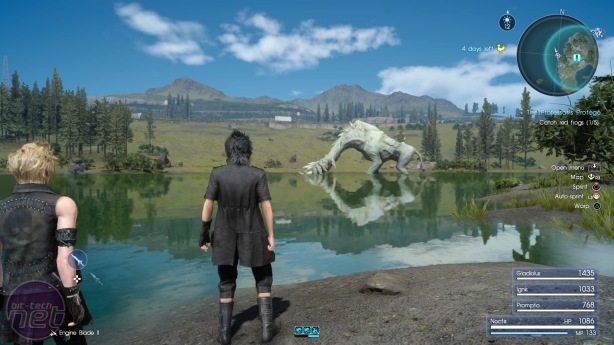
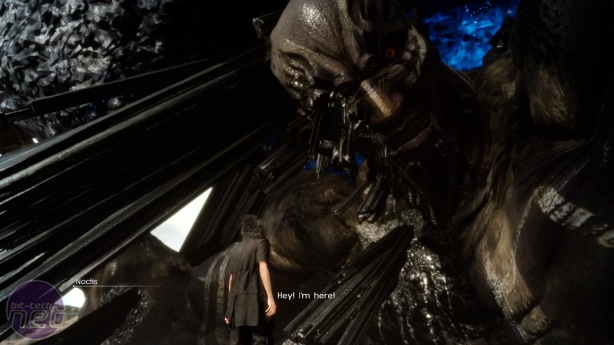
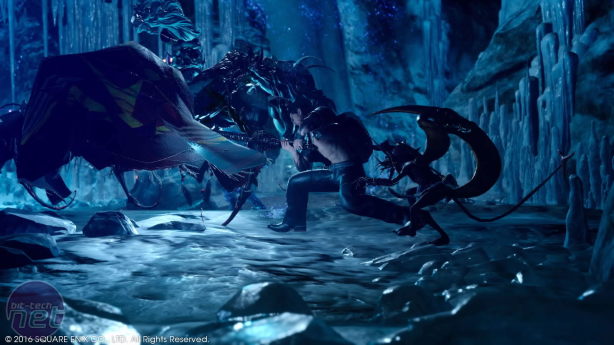
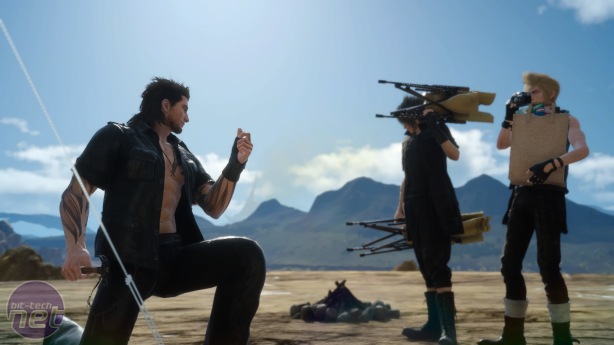
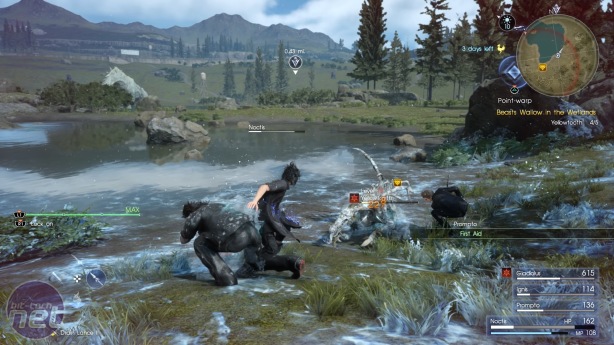
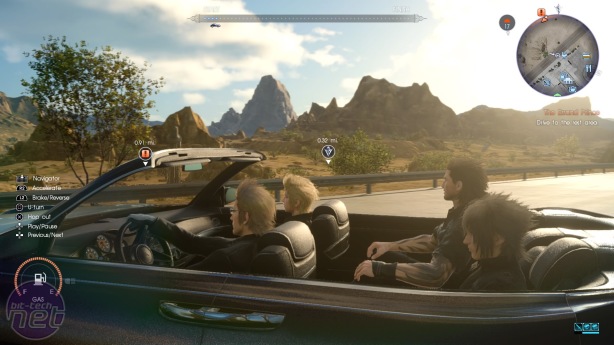








Want to comment? Please log in.